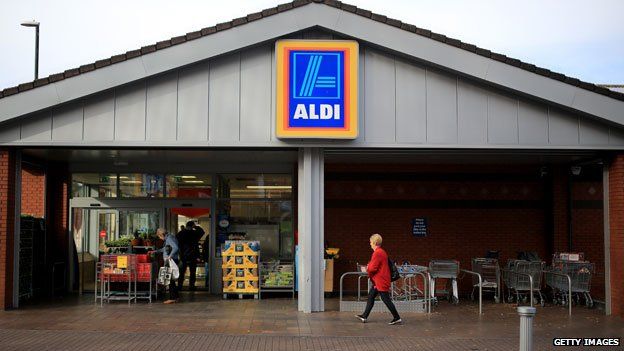Five ways Aldi cracked the supermarket business
- Published

Karl Albrecht, the co-founder of German discount supermarket chain Aldi along with brother Theo, has died. But how has Aldi become a household name, asks Chris Stokel-Walker.
1. Basic store layout
Walking into an Aldi is a totally different experience to walking into a gargantuan superstore such as Tesco or Asda. Bright, spacious rooms decorated with huge gaudy hoardings are replaced with small, dimly-lit shops with narrow aisles and sparse shelves. The chain sells a fraction of the items bigger supermarkets do, focusing on a single own-brand variant of any given product. As German newspaper Der Spiegel wrote in 2010, talking about Aldi's first forays into retail in Germany, "this nation of sensible shoppers got the grocery market it deserved: as cheap as possible, practical and with absolutely no frills."
2. Sell bursts of unusual items
The supermarket is famous for its flash sales. Ski poles, cycling equipment and tablet computers have all made fleeting visits to Aldi's shelves - but only in limited numbers. These higher-price items, available for a short time only, are "a great way of getting people to come back to the store," says retail analyst Graham Soult. "It's random stuff but it taps into the quirkiness of Aldi, that they sell items the other supermarkets don't."
3. General penny pinching
The financial fastidiousness of the Albrecht brothers as they led Aldi to success in their native Germany was well-known. Checkout staff had to hand type product codes into their tills in Germany until the early 2000s because the firm didn't want to pay for swish scanning systems that had been standard in other supermarkets for decades. Staff at its headquarters were said to have been chastised for using brand new pencils, rather than wearing out the lead on older ones. And the site where both brothers are buried in Essen was spruced up after complaints with new rhododendrons - bought, on offer, from Aldi's own store.
4. Satisfying middle-class shoppers
Aldi's customer base has changed as savvy middle-class shoppers started using the store. Its proportion of shoppers in the UK classified in the AB social category has increased from around 13% in 2012 to 19% today. The supermarket has altered its stock to cater to them. Alongside continental cheeses and meats - already seen as exotic - it has branched out into more luxury items. Late last year it introduced cut-price fresh lobster tails and serrano ham in time for Christmas. Last month it began stocking trendy Wagyu beef steaks at a reduced price.
5. Be in the right place at the right time
Aldi's massive growth in the UK coincided with a time of tightened purse strings. Low price is still the key. "In the last few years everything seems to have aligned," says Soult. Reportedly the only public statement that co-founder Karl Albrecht said in the entire history of the company was made in 1953, but was as pertinent to British shoppers in the post-crash world of 2007 as it was to German shoppers in the wake of World War Two: "Our advertisement is the cheap price." It has also benefited from a change in what shoppers want supermarkets to be. "In the 1990s, supermarkets were getting bigger and bigger," explains Soult. "Now the trend has shifted, and smaller stores like Aldi are what people want."
Subscribe to the BBC News Magazine's email newsletter to get articles sent to your inbox.